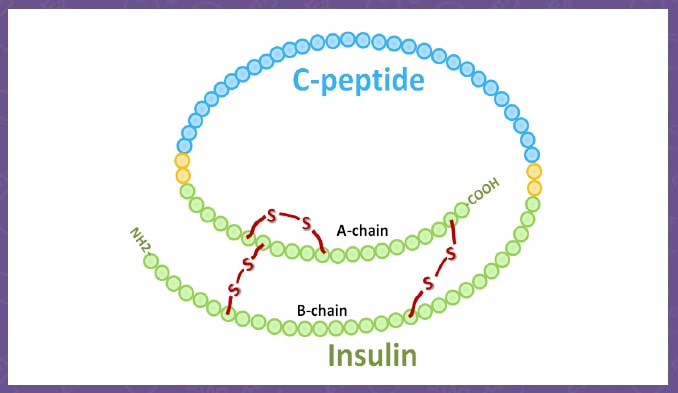Why is C-peptide an important indicator?
The C-peptide test is a tool used to check whether you have type 1 diabetes, where the immune system attacks and destroys cells in the pancreas, or type 2, where the body doesn't use insulin as it should. This indicator determines how fully the body produces insulin, which carries glucose from the blood into the cells. The test can help decide whether you need to take insulin.
Other names: insulin C-peptide, insulin binding peptide, proinsulin C-peptide
Why is C-peptide being studied?
Beta cells in the pancreas produce insulin. C-peptide is also released during this process. When insulin is released into the bloodstream to help transport glucose into the body's cells (to be used for energy), equal amounts of C-peptide are released. One molecule of C-peptide and one molecule of insulin are made from proinsulin. C-peptide does not affect blood sugar levels, but it stays in the blood longer than insulin, so it is easier to measure accurately. This makes C-peptide useful as a marker of insulin production. The C-peptide test can provide an accurate measurement even if insulin is taken for diabetes. C-peptide levels are not affected by the insulin you take.
The C-peptide test can be used to:
- To determine type 1 or 2 diabetes if the diagnosis is uncertain
- In the presence of type 1 diabetes - how much insulin the pancreas produces
- To determine initiation of insulin therapy in type 2 diabetes
- In insulin resistance
- In hypoglycaemia
- To diagnose a tumor of the pancreas that releases insulin, called an insulinoma
- When the pancreas is removed
Preparation and method of examination
It is necessary not to have eaten 8-10 hours before the examination. Venous blood is taken. Sometimes a C-peptide test is also required from urine, which needs to be collected 24 hours before.
Interpretation of results
The significance of the results depends on age, health status, medication intake, and the results of other tests, such as a blood sugar test.
High levels of C-peptide indicates high insulin levels. This may be due to excessive production of insulin by the body, a response to high blood sugar levels caused by glucose intake or insulin resistance, when the body's cells do not respond normally to insulin and so more insulin is produced in an attempt to compensate.
Causes of high insulin levels include:
- Type 2 diabetes
- Cushing's syndrome
- Insulin
- Kidney failure
- Low level of potassium in the blood
- A low level of C-peptide may mean that the body is not producing enough insulin.
Causes of low insulin levels include:
- Type 1 diabetes and in some cases type 2 diabetes
- Taking too much insulin to treat diabetes (Taking more insulin than needed can prevent the pancreas from producing insulin on its own)
- Severe infection
- Addison's disease
- Liver disease








